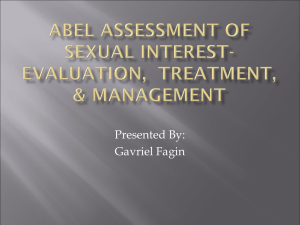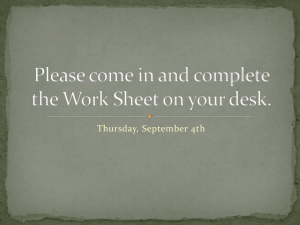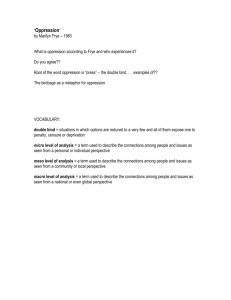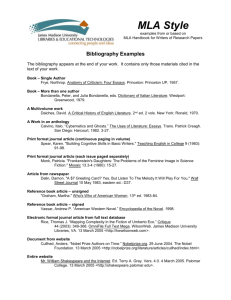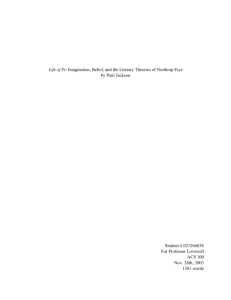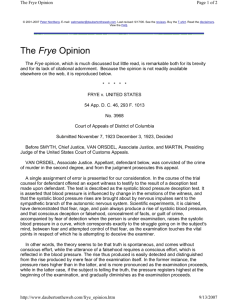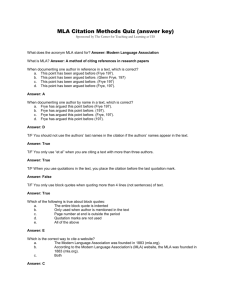File
advertisement
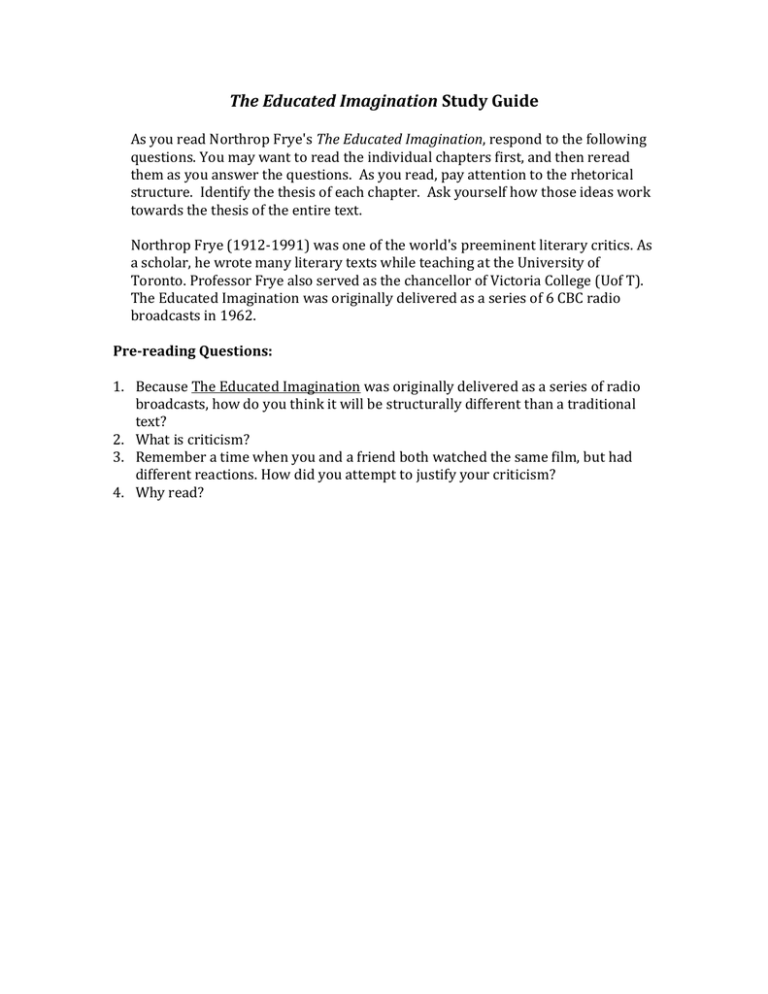
The Educated Imagination Study Guide As you read Northrop Frye's The Educated Imagination, respond to the following questions. You may want to read the individual chapters first, and then reread them as you answer the questions. As you read, pay attention to the rhetorical structure. Identify the thesis of each chapter. Ask yourself how those ideas work towards the thesis of the entire text. Northrop Frye (1912-1991) was one of the world's preeminent literary critics. As a scholar, he wrote many literary texts while teaching at the University of Toronto. Professor Frye also served as the chancellor of Victoria College (Uof T). The Educated Imagination was originally delivered as a series of 6 CBC radio broadcasts in 1962. Pre-reading Questions: 1. Because The Educated Imagination was originally delivered as a series of radio broadcasts, how do you think it will be structurally different than a traditional text? 2. What is criticism? 3. Remember a time when you and a friend both watched the same film, but had different reactions. How did you attempt to justify your criticism? 4. Why read? Chapter 1: “The Motive for Metaphor” Questions 1. How do you identify anything? 2. What is a metaphor? Why do you use them? 3. What are the “simple” questions according to Frye? 4. What style does Frye say he is going to use? Why? 5. What are the first two things Frye would like to discuss? 6. What do we use to understand literature? 7. What are the two specific questions that Frye poses? 8. Why does Frye use the word objective to describe the island? 9. What are the things you notice in that objective world? 10. How does Frye explain the way you would feel on the island? 11. What alternates constantly on this 1st “level” (consciousness / awareness)? Why? 12. What is the “language” of the 1st level? Why? 13. Why does science begin on this level? 14. When would you have peacefulness and joy on this island? What does Frye call theses moods? Why? 15. Explain “have and want” in relation to the island. 16. What will you construct? Why? What do you build it with? 17. What are the “human forms of nature, or the form of human nature”? 18. What is the “language” of the 2nd level? Why? 19. What is the “language” of the 3rd level? Why? 20. How does the imagination of man factor in to the “have and want” construct? What can the imagination build? 21. What are typical uses of the three levels? 22. What does the study of science constantly do? How does this contrast to literature? 23. Can we expect linear growth with literature? What is Frye's “simple point”? 24. Note that Frye takes us back to the island one more time. Why? 25. What is the limit of the imagination? 26. How does understanding occur? 27. Using our poetry notes, read Stevens' “The Motive for Metaphor”. What sensory imagery do you find? 28. Define metaphor using the last 2 paragraphs. 29. Define simile using the last 2 paragraphs. 30. What is the job of the poet? 31. What is Stevens' definition of metaphor? Chapter 2: “The Singing School” Questions 1. Think about how The Educated Imagination was first delivered. Why does Frye structure the first paragraph of “The Singing School” in this way? 2. What does Frye say about identification? Reread your answer to question 1 of the previous section. 3. If you were shipwrecked on a deserted island, what would you do? Why? What would influence you? What would primitive people do? Why? 4. What happens to ideas when the stop being beliefs? How does Frye prove this using the ancient poet Horace? 5. How does literature develop? What do the various forms derive from? 6. What is a convention? Give an example of a convention from your favorite music genre. 7. What is Frye's “principle”? How does this “principle” affect literary forms? 8. How does Frye clarify what he is saying about “there's nothing new”? 9. What are his two points? Please note that the second point begins at the end of the Campion paragraph. 10. What are you reminded of as you read any novel or watch any movie or listen to any song? 11. Why must you read more? 12. Frye makes an allusion to “the hero with a thousand faces” (Joseph Campbell's Monomyth). What is so important about this reoccurring cycle? 13. Why does he describe all of the primitive stories as a backbone? What is the backbone of? 14. Why does Frye take you back to the island one last time? 15. What is the feeling of identity? 16. When you don't belong, what does the metaphor attempt to do? 17. What is the framework of all literature? Why? 18. What still haunts modern man? Who fills in the shadows of the cloud? Why? 19. What is “The Singing School”? Chapter 3: “Giants in Time” Questions 1. 2. 3. 4. 5. 6. 7. 8. 9. What do we meet in literature? What is the poet's job? Why watch Macbeth, or anything for that matter (theme)? Could Achilles ever be real? What are characters? What do sheep and grass have to with symbols (imagery into symbol)? What is allegory? What is allusion? Why are allusions so important to Frye's thesis? If western civilization is based on “the Bible and the central stories of Greek and Roman literature”, what must you understand? Why? 10. How / what do we relate poems and novels to? 11. How did Roman literature evolve? What does this mean for any culture? 12. How is tolerance formed? How does detachment play a role? 13. Why must literature be kept alive? What purpose does it serve? 14. What does the title of this chapter mean? Chapter 4: “The Keys to Dreamland” Questions 1. Where does Frye set you in the beginning of this chapter? Why? 2. Is there such a thing as a morally bad novel? Why? 3. What do you relate literature to? 4. Explain the castle metaphor. 5. What does literature keep presenting us? Why? 6. What is the best way to develop your imagination? 7. What are the two powers of literature? 8. What are the two kinds of response? 9. Why is it important to focus our critical response? 10. The definition of apocalypse is revelation. What is the apocalypse of literature? Who is responsible for this? 11. What does the title of this chapter mean? Chapter 5: “Verticals of Adam” Questions 1. What question does Frye want to tackle in this chapter? 2. In the second paragraph, note Frye's argument structure. What 5 things does he remind you of? Why place this so close to the beginning? 3. How does he frame the Christian Bible (Old and New Testaments)? 4. Why teach this text as literature? 5. What should children be taught next as literature? 6. What should be done with the reoccurring stories found in both texts? 7. Explain the myth sequence that the Romans, Greeks and authors of the Bible used. 8. What are the four forms? How should they be taught? 9. What is the most important critical habit that teachers want their students to do? Why? 10. Explain the baking soda (stomach antacid / heartburn) reference. 11. Why is listening part of basic training? Who is responsible for this facet of a child's education? 12. Once the framework is present, what should students attempt next? 13. Explain what is meant by "construction". How does this affect the reader and the writer? 14. What is the centre of literature? Why study this first? 15. What is poetry? 16. What is the "real place for literature"? 17. What is the "hare-and-tortoise" race? How does teaching literature fit into this? 18. What is the, "end of literary teaching"? What do teachers want to transfer? 19. What does the title mean? Who is Adam, and what does he represent? Reread your answer to Chapter 2, question 13. What are the verticals? Chapter 6: "The Vocation of Eloquence" Questions 1. What is the language of the imagination? What is the importance of its study? 2. What is the simple choice Frye begins this chapter with? 3. What does advertising/media have to do with the presentation of the elements of literature? 4. What is the voice of the imagination? How does it work? 5. Why can emotional responses be dangerous? 6. What is the "fundamental job of the imagination"? 7. What does the imagination protect us from? 8. What appeal does advertising make to the imagination? 9. Why do corporations, government and institutions use jargon (anti-personnel bomb, IED, insurgent, casualty)? 10. What is the myth of the past? 11. What is the myth of progress? 12. What happens in a society that changes rapidly? Note that Frye is talking about the western world in 1962. What about our frantic world? 13. What does "the power of choice" have to do with your imagination? 14. What is fundamental to our society? What is the battleground? 15. Explain the piano reference. 16. What does man realize? Where is the vision? 17. The last 3 paragraphs recap the entire text. What is the power of the imagination outlined in the first and second of these last 3 paragraphs? 18. What is the Tower of Babel? What does Frye warn us about? 19. The second last sentence begins with "It never [...]", what is "it"? How do humans like Gandhi, Shakespeare, and Lincoln use "it"? Reflective Essay Response Having been exposed to the lectures in The Educated Imagination, respond to the following question: Select 3 key ideas that Frye suggests constitute an educated imagination. Using a formal essay structure, discuss the importance of those three concepts to the study of literature. Refer to literature that you have studied or read either in school or on your own.
